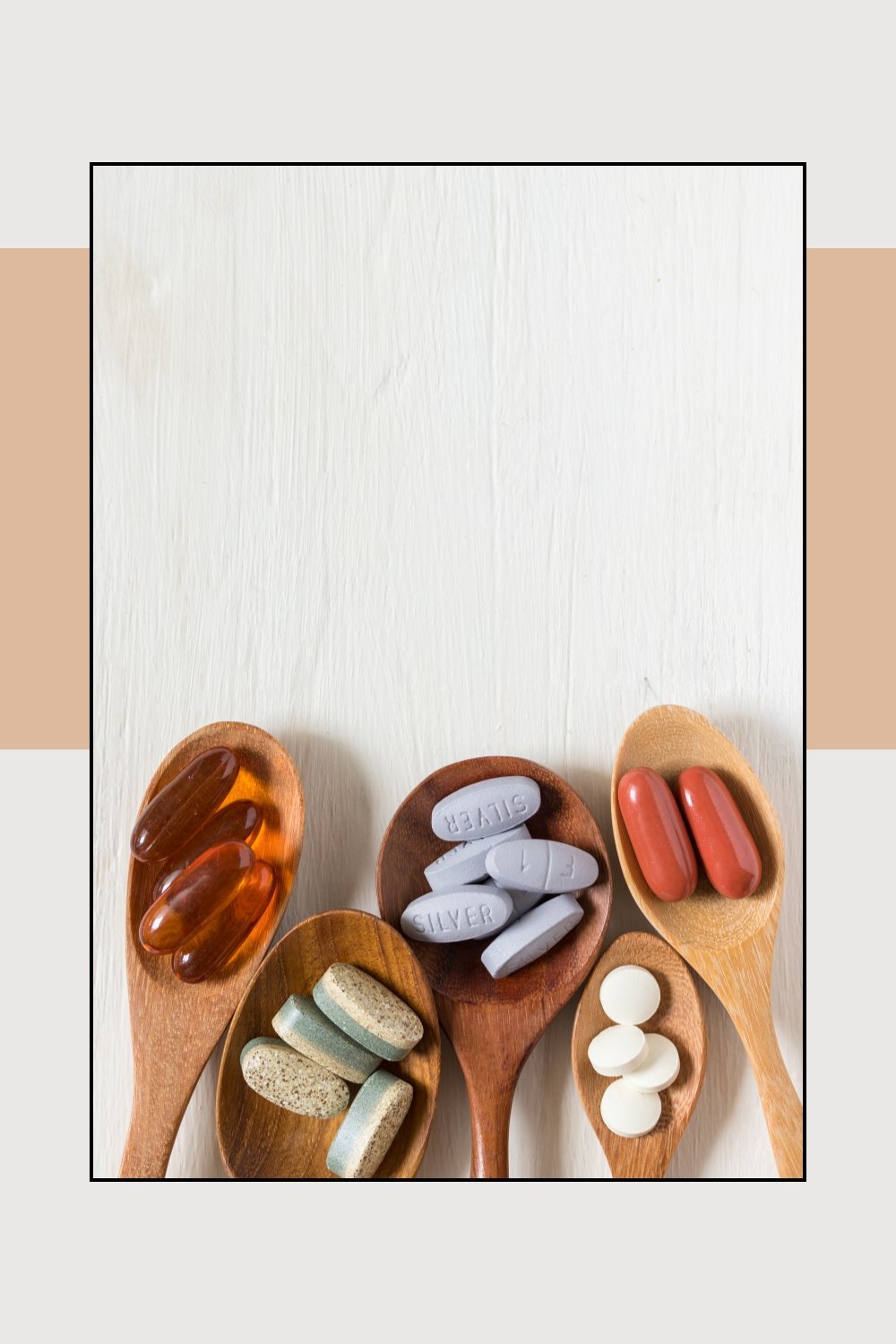Supplements to Lower Cortisol: W&S Approved Cortisol Balancing Favs
SHARE ON:
DISCLAIMER: Please consult a qualified healthcare professional before considering any new health or wellness regimen. Always seek the advice of your physician or other qualified health provider with any questions you may have regarding a medical condition or dietary issues. Never disregard professional medical advice or delay in seeking it because of information provided in this article. The content is for informational purposes only and should not be considered a substitute for professional medical advice, diagnosis, or treatment. Always consult with your healthcare provider to address any health concerns you may have. Before reading the following content, we also suggest reading our full disclaimer statement here.
TRIGGER WARNING(S): This article contains discussions of diet, body, weight and appearance. Reader discretion is advised for those who may find these topics distressing or triggering. Please prioritize your mental well-being while engaging with this content.
Some of the links on this post might contain affiliate links. If you use any of these links to buy something we may earn a commission. For more information, please check out our disclosure statement. Thanks so much for supporting our free content!
@happyfitzam Experiencing these familiar symptoms? 😩 I did too… And they often overlap with other hormonal imbalances. What is high cortisol? It's your stress hormone soaring. Stress can come from the usual suspects like work, hectic schedules, traumatic experiences, or relationships. But it can also sneak in from less obvious sources, like dietary sensitivities, sleep troubles, or inadequate nutrition. I have experienced this, which is why I share tips and provide guidance through my 1:1 coaching program. So you don’t have to make the mistakes I did! :D Only taking a limited amount of clients through the end of the year so schedule your 1:1 call with me via the link in my bio if this resonates with you. 💕✨ . . . #hormonehealth #hormonetips #hormoneimbalance #highcortisol #hormonebalancingdiet #hormonetesting #cortisolimbalancetips #cortisolsymptoms #healthandwellness #bellyfat ♬ original sound - Zam 🫶
We saw this amazing TikTok from @happyfitzam (check out her content!) and got inspired to make this article about supplements to lower cortisol in the body.
--
Looking to improve your health and make some changes to your self care routine? This article delves into the symptoms of cortisol imbalance, and highlights the importance of a tailored supplement routine to bridge nutritional gaps and offers practical advice on incorporating high-quality, supplements into your daily wellness practices.
In this Article
Not ready to read through just yet? No problem, save it on Pinterest!
Before diving into the best supplements to help balance cortisol levels, it's important to recognize the signs of cortisol imbalance. Identifying these symptoms can help you determine whether cortisol may be a factor in how you're feeling and guide you toward potential solutions for achieving better health and well-being.
Here are some common signs of cortisol imbalance that women should be aware of:
Fatigue and Low Energy: Persistent fatigue that doesn’t improve with rest can be a sign of cortisol imbalance. If you find yourself feeling constantly tired, even after a full night's sleep, cortisol might be a contributing factor.
Weight Gain, Especially Around the Midsection: Increased cortisol levels can lead to weight gain, particularly around the abdomen. If you're experiencing unexplained weight gain in this area, it could be linked to elevated cortisol levels.
Mood Swings and Irritability: High cortisol levels can affect your mood, leading to increased irritability, anxiety, or depression. If you notice significant changes in your emotional well-being, cortisol imbalance might be playing a role.
Difficulty Sleeping: Cortisol is supposed to follow a natural rhythm, peaking in the morning and tapering off at night. However, an imbalance can disrupt this cycle, leading to difficulties falling asleep or staying asleep, resulting in poor sleep quality.
Weakened Immune System: Cortisol helps regulate the immune system, but chronic high levels can suppress immune function, making you more susceptible to infections and illnesses. If you find yourself frequently getting sick, it might be worth considering your cortisol levels.
Digestive Issues: Elevated cortisol levels can negatively impact your digestive health, leading to problems such as bloating, abdominal pain, and changes in appetite. If you’re experiencing ongoing digestive discomfort, it may be related to cortisol.
Recognizing these symptoms is the first step in addressing cortisol imbalance. Many women may not immediately connect these issues to cortisol, but understanding the potential link can open the door to effective solutions. Incorporating specific supplements into your wellness routine can be a powerful strategy to help manage and balance cortisol levels, ultimately improving your overall health and well-being.
Why You Might Want to Consider Supplements to Lower Cortisol
Unfortunately, stress seems to be an inevitable part of daily life for many. Whether it's due to work pressures, personal challenges, or societal demands, our bodies often respond to stress by releasing cortisol, often referred to as the "stress hormone." But what exactly is cortisol, and why might you want to consider supplements to lower its levels?
Understanding Cortisol
Cortisol is a hormone produced by the adrenal glands, which are located on top of each kidney. It plays a crucial role in the body's response to stress, helping regulate various physiological functions, including metabolism, immune response, and blood sugar levels. In essence, cortisol is part of the body's natural alarm system, signaling to the brain and other organs that a stressful situation has arisen.
Wondering why you’re seeing ads? Check out our Disclosure Policy.
The Impact of Cortisol on Health and Well-being
While cortisol serves a vital function in the body's stress response, chronically elevated levels can have significant negative consequences for health and well-being. Prolonged exposure to high cortisol levels has been linked to a range of health issues, including:
Impaired Immune Function: Elevated cortisol levels can suppress the immune system, making individuals more susceptible to infections and illnesses.
Metabolic Imbalances: Cortisol plays a role in regulating metabolism, but excessive levels can lead to imbalances, contributing to weight gain, particularly around the abdomen.
Cardiovascular Problems: Chronic stress and high cortisol levels have been associated with an increased risk of hypertension, heart disease, and stroke.
Mental Health Disorders: Cortisol can affect mood and cognitive function, and prolonged stress may increase the risk of anxiety, depression, and other mental health disorders.
The Consequences of High Cortisol
When cortisol levels remain elevated for extended periods, the body can experience a range of adverse effects. These may include:
Increased Blood Sugar Levels: Cortisol stimulates the liver to release glucose into the bloodstream, providing a quick source of energy to cope with stress. However, chronically high blood sugar levels can lead to insulin resistance and type 2 diabetes.
Suppressed Digestion: Cortisol inhibits digestive processes, diverting resources away from non-essential functions like digestion and reproductive function during times of stress. This can result in digestive issues such as indigestion, bloating, and irritable bowel syndrome (IBS).
Muscle Breakdown: Cortisol promotes the breakdown of muscle tissue to release amino acids for energy production, which can lead to muscle weakness and wasting over time.
Factors That Increase Cortisol Levels
Several factors can contribute to elevated cortisol levels, including:
Chronic Stress: Persistent stressors such as work deadlines, financial worries, or relationship problems can lead to sustained elevation of cortisol levels.
Poor Sleep: Inadequate or disrupted sleep can disrupt the body's natural cortisol rhythms, leading to higher levels of cortisol throughout the day.
Unhealthy Lifestyle Habits: Factors such as a poor diet, excessive caffeine intake, and lack of exercise can all contribute to elevated cortisol levels.
Medical Conditions: Certain medical conditions, such as Cushing's syndrome and adrenal disorders, can cause excessive cortisol production, leading to chronically high levels.
“
Considering the impact of stress on modern life, exploring supplements to help lower cortisol levels may offer potential benefits for individuals looking to mitigate the negative effects of chronic stress on their health.
In conclusion, while cortisol serves important functions in the body's stress response, chronically elevated levels can have detrimental effects on health and well-being. Considering the impact of stress on modern life, exploring supplements to help lower cortisol levels may offer potential benefits for individuals looking to mitigate the negative effects of chronic stress on their health.
How to Incorporate Supplements to Lower Cortisol in your Wellness Routine
Many American women find themselves juggling multiple responsibilities, often leaving little time to focus on their health and well-being. Despite efforts to maintain a balanced diet, research indicates that the average American woman may not be meeting the recommended daily intake of essential vitamins and minerals. This nutritional gap can have significant implications for overall health and vitality, underscoring the importance of incorporating supplements into one's wellness routine.
According to data from the National Health and Nutrition Examination Survey (NHANES), a significant portion of the U.S. population, including women, falls short of meeting the recommended dietary guidelines for key nutrients such as vitamin D, calcium, magnesium, and vitamin C. This shortfall can be attributed to various factors, including dietary preferences, food accessibility, and lifestyle habits. In response to these challenges, many women turn to supplements as a convenient and effective way to bridge their nutritional gaps and ensure they're getting the essential nutrients they need to support their health.
Wondering why you’re seeing ads? Check out our Disclosure Policy.
However, not all supplements are created equal, and it's essential to approach supplementation with caution and discernment. One crucial consideration is the timing of supplement intake, as some nutrients are best absorbed when taken at specific times of the day or in conjunction with meals. For example, calcium supplements are often recommended to be taken with food to enhance absorption, while vitamin D supplements may be more effectively absorbed when taken in the morning with breakfast.
Furthermore, the menstrual cycle can also influence the timing of supplement intake for women. For instance, iron supplementation may be more beneficial during menstruation to replenish iron stores lost through blood loss, while magnesium supplementation may be more helpful during the luteal phase to support mood and relaxation.
When selecting supplements, quality is paramount. Not all supplements are created equal, and consumers should be vigilant in researching and selecting reputable brands with transparent manufacturing processes and third-party testing for potency and purity. Look for supplements that are formulated with bioavailable forms of nutrients and free from unnecessary fillers, additives, and allergens.
Additionally, it's essential to consider the ethical and dietary preferences of individuals when choosing supplements. While many supplements are vegan-friendly, some may contain animal-derived ingredients such as gelatin or fish oil. For those following a vegan lifestyle or looking to reduce their consumption of animal products, it's crucial to opt for supplements labeled as "vegan" or "plant-based" to align with their dietary preferences.
However, it's important to note that supplements should never be viewed as a substitute for a healthy, balanced diet. While supplements can complement dietary intake and provide additional nutritional support, they should not be relied upon to compensate for poor dietary choices or lifestyle habits. A balanced diet rich in whole foods, including fruits, vegetables, whole grains, lean proteins, and healthy fats, remains the cornerstone of optimal health and well-being.
Regardless, incorporating supplements into your wellness routine can be a valuable strategy for supporting overall health and bridging nutritional gaps. By selecting high-quality supplements, considering timing and individual needs, and maintaining a balanced diet, women can optimize their health and well-being for a vibrant and fulfilling life.
Our Favorite Brands and Supplements to Lower Cortisol
1. Ashwagandha
What it is: Ashwagandha (Withania somnifera) is an adaptogenic herb that has been widely studied for its stress-reducing properties.
How it works: Research indicates that ashwagandha can significantly lower cortisol levels by modulating the hypothalamic-pituitary-adrenal (HPA) axis, which is the central stress response system. The active compounds in ashwagandha, such as withanolides, are believed to inhibit the overactivity of the HPA axis, thus reducing stress-induced cortisol secretion and promoting a sense of calm and well-being.
Where to buy:
We think this product from Plant People is a guaranteed supplement to lower cortisol as it combines the power of nature with scientific research to ease stress and anxiety while promoting a good mood. These zero-sugar, vegan mushroom gummies come in a delicious summer peach flavor, crafted by chefs using organic ingredients. Each pouch offers a 30-day supply of 60 gummies, ensuring you have a consistent, non-drowsy solution for daily stress relief. We love that they're sugar-free, gluten-free, lab-tested, and free from the top 8 allergens, providing a safe and healthy choice. With a potent formula featuring 900mg per serving of Ashwagandha, Reishi, L-Theanine, and Rhodiola, and made from 100% fruiting bodies with a 10:1 extract, these gummies deliver effective results. Plus, they're packaged in a recycled, resealable pouch for sustainability and convenience. Say goodbye to high-fructose corn syrup, food dyes, dextrose, sucrose, seed oils, herbicides, and pesticides, and hello to a natural way to manage your stress levels.
Wondering why you’re seeing ads? Check out our Disclosure Policy.
2. Phosphatidylserine
What it is: Phosphatidylserine is a phospholipid that is essential for the functioning of brain cells and is found naturally in high concentrations in the brain.
How it works: Phosphatidylserine has been shown to blunt the cortisol response to physical stress. According to a study in the Journal of the International Society of Sports Nutrition, supplementation with phosphatidylserine can lower cortisol levels and mitigate the effects of stress during intense physical activity . It is believed that phosphatidylserine helps to regulate the stress response by supporting the function of the HPA axis and enhancing the body's ability to recover from stress, thereby reducing overall cortisol production.
Where to buy:
Phosphatidylserine Powder, MyVegan
MyVegan’s Phosphatidylserine Powder is a fantastic supplement to lower cortisol as it provides a quick and easy way to boost your daily intake of this essential nutrient. Simply add 1g of the powder to water, fruit juice, or a shake, and enjoy it three times a day for optimal benefits. Remember, do not exceed 3g of phosphatidylserine per day to maintain safe and effective use.
Follow us on:
3. Omega-3 Fatty Acids
What it is: : Omega-3 fatty acids, particularly EPA (eicosapentaenoic acid) and DHA (docosahexaenoic acid), have been shown to reduce cortisol levels and improve stress resilience.
How it Works: These fatty acids exert anti-inflammatory effects and influence brain function by integrating into cell membranes, which can modulate neuroinflammatory processes and neurotransmitter pathways associated with stress. Omega-3s are thought to enhance the body's ability to handle stress by improving neuronal health and reducing inflammation, which in turn lowers cortisol production.
Where to buy:
Multi – Vegan Multivitamin, Form
This multivitamin from Form is an essential supplement to lower cortisol, thanks to its comprehensive and completely vegan formula that includes omega-3. This multivitamin is designed to support overall health and wellness by providing a wide range of essential nutrients that your body needs daily. The inclusion of omega-3 ensures you're getting critical fatty acids that support brain function, heart health, and reduce inflammation. By incorporating Forms' multivitamin into your routine, you're not only promoting a balanced diet but also giving your body the tools it needs to manage stress effectively. This easy-to-take supplement is a perfect addition to your daily regimen, ensuring you receive optimal nutrition without compromising on your values
Most Read from Health & Wellness
4. Magnesium
What it is: Magnesium is a vital mineral involved in numerous biochemical reactions in the body, including those that regulate stress responses.
How it works: Magnesium plays a critical role in the function of the HPA axis and has been shown to reduce the release of cortisol under stress. Additionally, magnesium helps to relax the nervous system by acting as a natural calcium blocker and promoting the activity of GABA, a neurotransmitter that induces relaxation and reduces stress.
Where to buy:
Food-Grown® Magnesium, Wild Nutrition
Wild Nutrition's magnesium supplement is a fantastic way to lower cortisol due to its unique Food-Grown® process, which integrates magnesium into raw, live food paste. This method ensures the complete biochemistry of the mineral is preserved, including glycoproteins, lipids, and amino acids, as well as the full spectrum of seven magnesium compounds. This is magnesium as nature intended, offering a highly bioavailable and effective form of the mineral. We also love Wild Nutrition's commitment to sustainability; the first order comes in a refillable glass jar, and as a B Certified company, they have implemented refillable, recyclable packaging for 99% of their range, saving 22.5km of paper wrap with their new boxes. Incorporating this supplement into your routine supports not only your health but also the environment.
Written by:
Teyah Nichole
Nichole is an American (she/her), animal-loving, coffee-obsessed, small-talk hating, ENFJ-T , vegetarian based in London. She founded W&S almost two years ago before starting her PhD, with a desire to learn in community with like-minded women. [Get in touch]
Wondering why you’re seeing ads? Check out our Disclosure Policy.



















As we approach conscious living, we often tend to forget this critical part of our health.